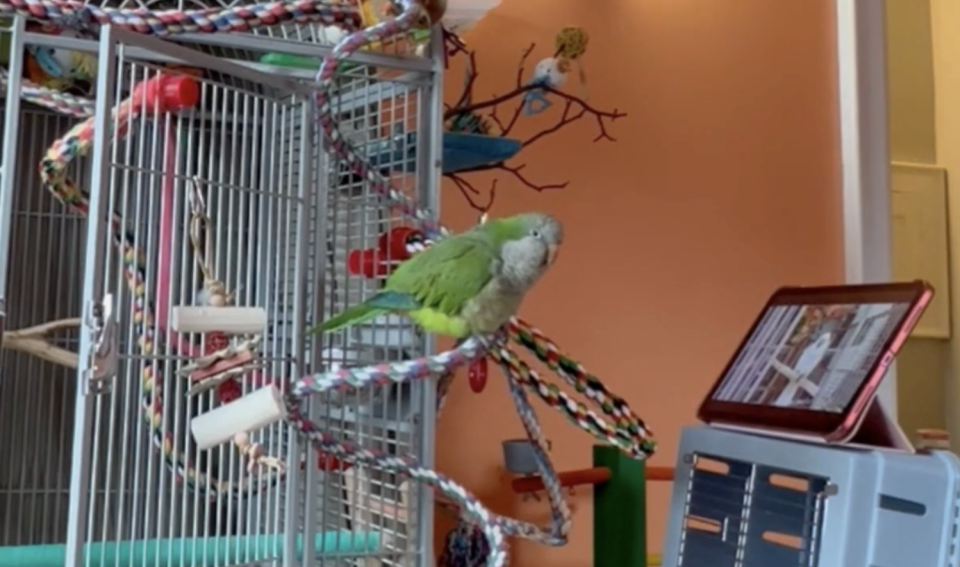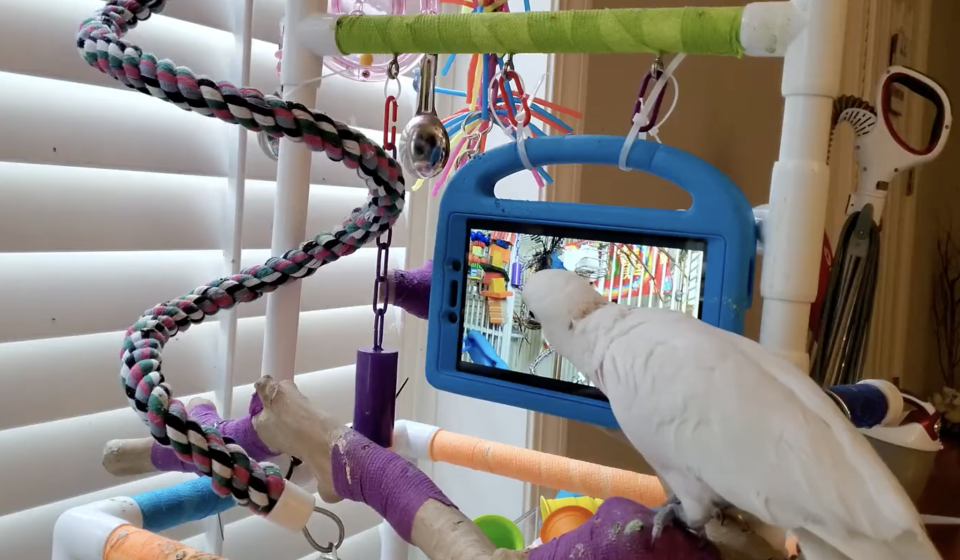Parrots taught to video call friends ‘prefer live chats over recorded messages’
Does Polly want a cracker? Possibly. But she may prefer a live video chat with her friend instead.
New research by the University of Glasgow suggests pet parrots taught to make video calls on Facebook Messenger may prefer live chats with their friends rather than listen to recorded messages.
Scientists believe this is because the birds may be able to tell the difference between live and pre-recorded videos.
They said the findings, which will be presented at the Association of Computing Machinery’s CHI conference on Human Factors in Computing Systems, could pave the way for a future with an “animal-centred internet”, allowing pets to interact with each other – as well as with humans – using technology.
Lead author Dr Ilyena Hirskyj-Douglas, from the University of Glasgow’s School of Computing Science, said: “Working closely with caregivers to design the study has given us new insight into how these intelligent birds react to the complex stimulus digital tablets can provide.
“The appearance of ‘liveness’ really did seem to make a difference to the parrots’ engagement with their screens.
“Their behaviour while interacting with another live bird often reflected behaviours they would engage in with other parrots in real life, which wasn’t the case in the pre-recorded sessions.
“Some caregivers believed that their parrots were capable of differentiating between the sessions.
“One told us that their bird enjoyed vocalising with another live bird but quickly lost interest when there was no response to their calls during pre-recorded videos.”

For the study, which also involved a team from Northeastern University in the US, the researchers wanted to explore the online social lives of nine pet parrots.
It builds on previous research by this team which showed parrots who called their friends on video were less lonely.
Each bird had a profile created with their photo and tablets were provided to their owners so the birds could make video calls on Facebook Messenger.
The parrots were trained to ring a bell when they wanted to interact with the screen and also took part in a “meet and greet” session where they were introduced to other birds.
Over a course of six months, the birds were then given access to 12 video sessions, six of which were live calls with their Facebook friends while the remaining involved watching pre-recorded videos of their bird contacts.
Findings showed the parrots preferred live chats to pre-recorded sessions, spending a total of 561 minutes on live calls compared with 142 minutes on playback video.
The birds initiated 65 calls out of a possible 108 in the live phase, but just 40 in the pre-recorded sessions, the team said.
According to the findings, 77% of the caregivers said their parrot responded positively to the live calls and 70% said the same for the pre-recorded video.

Dr Hirskyj-Douglas said: “Our previous research had shown that parrots seem to benefit from the opportunity to video call each other, which could help reduce the mental and physical toll that living in domestic situations can take on them.
“In the wild, they live in flocks and socialise with each other constantly.
“As pets, they’re often kept on their own, which can cause them to develop negative behaviours like excessive pacing or feather-plucking.”
However, she said while it was a small study and definite conclusions cannot be made, the early results are compelling.
Dr Hirskyj-Douglas said: “The internet holds a great deal of potential for giving animals agency to interact with each other in new ways, but the systems we build to help them do that need to be designed around their specific needs and physical and mental abilities.
“Studies like this could help to lay the foundations of a truly animal-centred internet.”
The research has been accepted to appear in the journal Proceedings of the ACM Conference on Human Factors in Computing Systems.

